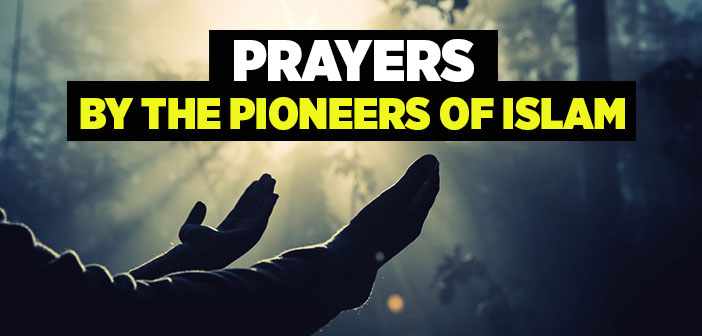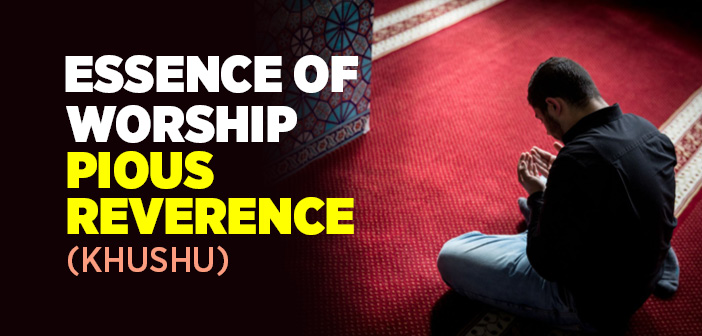Prayers by the Pioneers of Islam..
Omar, (May Allah be pleased with him), the second caliph, was mortally wounded by a disgruntled fire-worshipper. He was losing blood and in critical condition and soon lost consciousness. Yet, when it was time for prayer somebody stated close to his ear:
“O Omar! It is time for prayer!” Astonishingly, he then became aroused to perform his prayer. And afterwards he said:
“One who does not perform prayer has no place in Islam!” After these words he lost consciousness and later expired.
Ali, the fourth caliph, was growing pale and shedding all worldly senses while praying. When he was struck with an arrow in a battle he began prayer for somebody to remove the arrow from his body. He felt no pain while the arrow was being removed. He was once asked:
“– O Leader of Believers! Why is your face growing pale and your body shaking when it is time for prayer?”
He replied:
“It is time to perform a worship that the earth and the sky could not bear. And I do not know whether I will be able to do it perfectly, or not.”
All companions of the Prophet (J) used to have a feeling of awe and fear while praying.
Hasan (r.a), the grandson of the Prophet (J), used to turn pale while making ablution. Somebody who noticed that asked him:
“– O Hasan! Why do you turn pale while making ablution?”
He replied:
“– It is time to enter the presence of Allah, the All-Powerful, the Glorious, and the Great.”
Hasan used to read a prayer while entering the mosque as follows:
“O my Lord! Here is your servant at your door. O the most Merciful Lord! Your sinful servant is before You. You ordered Your righteous servants to forgive the evil acts of sinful people because You are the Most-Generous and the Most-Forgiving. Please forgive my sins and show mercy to me by Your Generosity and Compassion!”
Zayn al-Abidin used to turn pale whenever he rose to make ablution and his legs used to shake when he was about to pray. And he used to answer those who asked him “what happens to you” as follows:
“– Do not you ever know whose presence I am about to enter?”
Once, his house caught fire while he was in prayer, but he did not notice it. On completion of his prayer he was told about it, and he was asked:
“– What made you have no notice for what had happened?”
He answered:
“– The fire in the Hereafter prevented me from feeling this worldly fire.”
Muslim bin Yasar used to have the same kind of feeling during prayer. Once, while he was praying in a mosque in Basra, the mosque collapsed, but he did not notice what had happened and went on praying. On completion of his prayer he was asked:
“– The mosque collapsed, but you were indifferent to it? What makes you behave so?
“– Did it really collapse?”, he asked them in astonishment:
Sufyan al-Sawri was once in a great spiritual ecstasy. He secluded himself for seven days. He ate and drank nothing. His spiritual master was told about what he was doing and asked:
“– Is he conscious of the times of prayer?”
And he was told:
“– Of course, he is conscious, and he properly performs prayer.”
Upon hearing this, he said:
“– Thanks be to Allah who did not let Satan attack him.”
A lover of Allah narrates:
“I prayed a late-noon prayer which Dhunnun–i-Misri led. When he, a saint like servant of Allah, said, “Allah is Great!”, the word “Allah” was so powerful that I thought his soul left his body. And when he said “Great” my heart was torn into pieces.”
Amir bin Abdullah used to cut all his connection with the outside world and he used to say:
“I would prefer an arrow to pierce my body rather than being aware of the talks and acts of people around me while I am praying.”
Those who cannot pray as the companions of the Prophet (J) did are so alienated from the joy of prayer that they even have doubts about the transcendent nature of it. They lack the intelligence to understand that while people enjoy doing worldly and evil acts, why should they not too get spiritual pleasures from prayer. Yet, it is so difficult for those people who cannot appreciate this kind of pleasure to understand the nature of this joy. Those unwary people believe that humans can lose sight of everything in the face of engagements and conversations with their lovers, but they cannot perceive that one can take pleasure from prayer which enables the servant to have a conversation with Allah, the Most Beloved. What a blindness and deprivation this is.
In fact, true prayer leads the servant to perfection and knowledge of Allah. Therefore, performing prayer is regarded as an easy act by those who are strong in faith and whose hearts are adorned with the love of Allah; prayer provides them with an exceptional joy. That is why they always feel as if they are in prayer even though physically they are not. Waisal Qarani always wanted to remain in prayer. He was once visited by a friend while he was praying. His friend waited for him to finish the prayer, but upon seeing that he would not do so he said to himself:
“– O my soul! You came here to visit Waisal and benefit from his spirituality. Here is his highest condition. This is the best advice to you! Action speaks more than words! If you can manage to take a lesson from what you have seen, this is more than enough for you until the end of your life!”
It was a silent, unspoken and generous lesson for this person. And then, considering himself to have been endowed with Divine Blessings he left that place.
When it comes to those who are deprived of this position, Allah says about them in the Qur’an:
”.. And prayer: it is indeed hard, except to those who bring a lowly spirit.” (Baqara, 2:45).
It must be stated here that:
Though it may be possible to reach the level that the beloved of Allah do, we must try earnestly as much as our hearts and souls can manage. Satan sometimes deludes us not to pray because we cannot do it in pious reverence. This is a trap. This may lead one to go astray. It is better to pray, though it may not be done in complete pious reverence, than not praying. The difference between the two is great. Those who do not pray always incur losses. Yet, those who pray, though not perfectly, may one day be endowed with Divine Bounty that guides them to perform prayers acceptable before Allah. If we can do even just one prayer of this kind we may have the face to enter the presence of Allah.
Source: Osman Nuri Topbaş, ISLAM SPIRIT AND FORM, Erkam Publications





